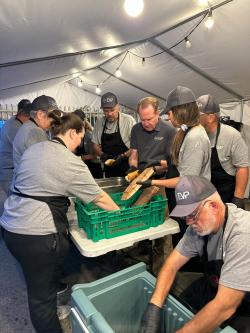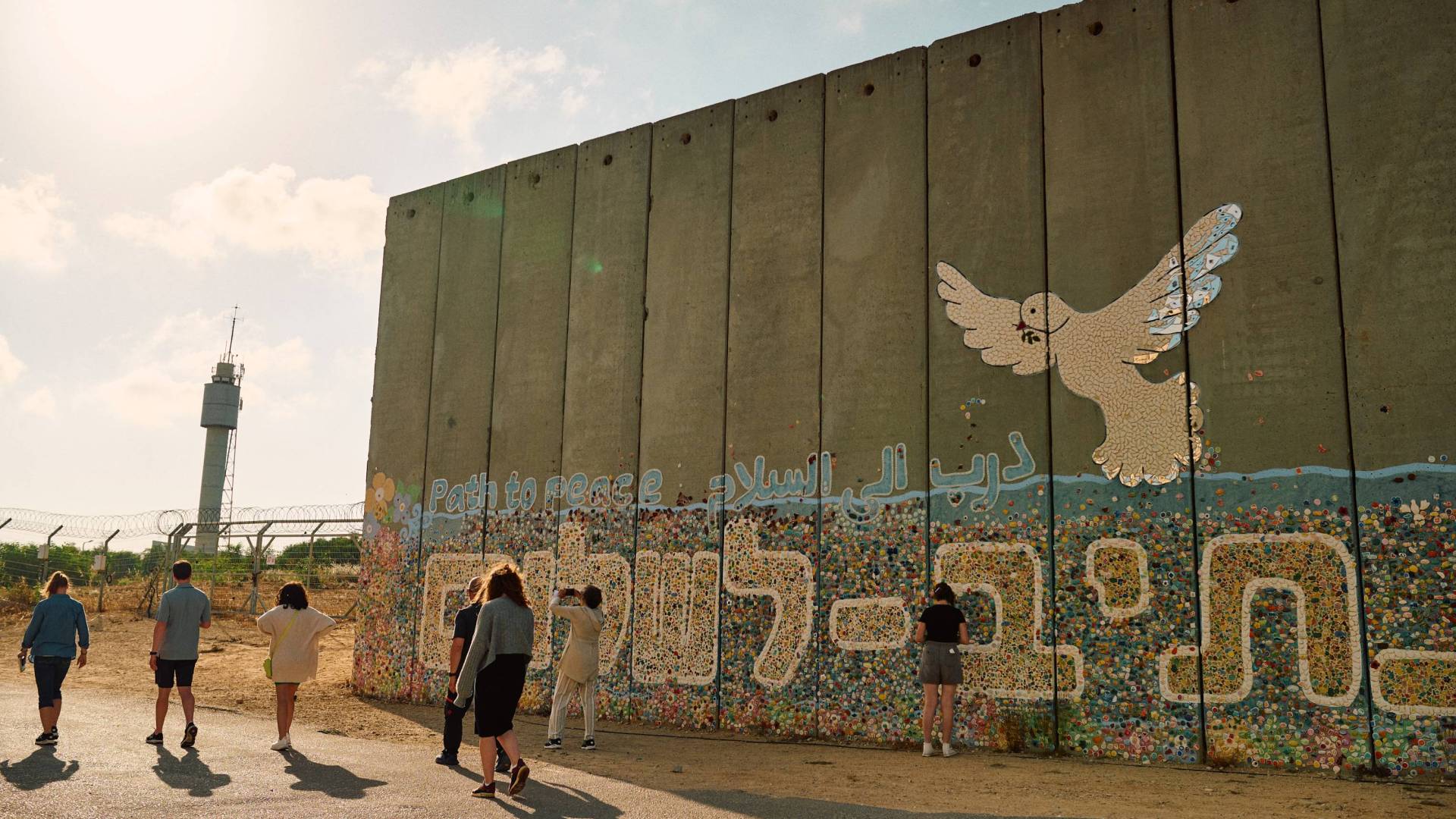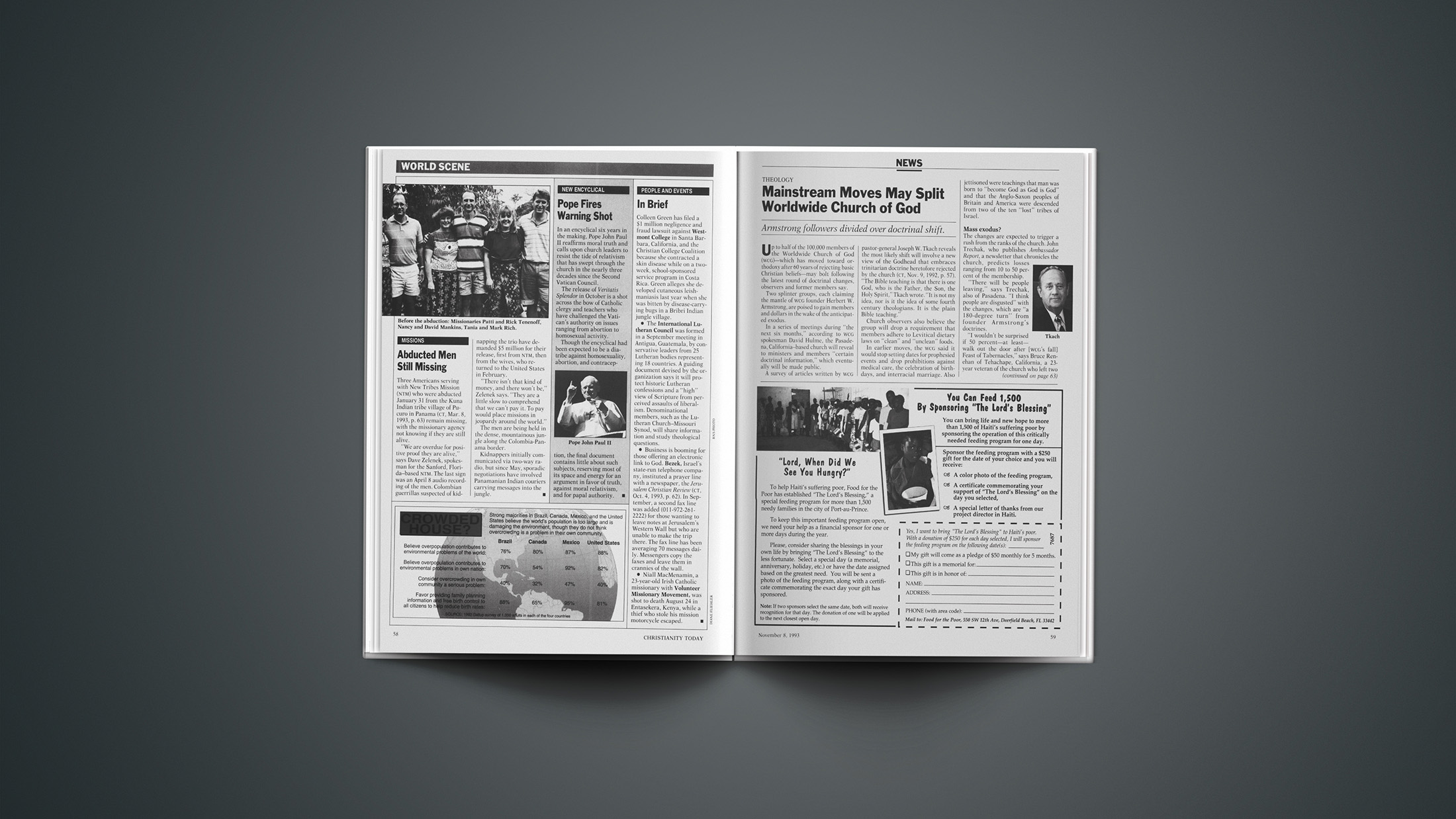When war broke out in Israel, organizations and ministries working in the country put crisis plans into action. They called up trained workers and volunteers, retrieved supplies from stocked warehouses, and drove bulletproof vehicles to deliver aid to victims and gear to first responders.
And they looked to Christians in the US and around the globe to help fund their efforts.
The International Christian Embassy Jerusalem (ICEJ) has received millions in donations since the war broke out, more than any other two-week period in its history.
Christians United for Israel (CUFI), which calls itself the largest pro-Israel organization in the US, sent $1 million to fund first responders within days of the October 7 barrage and continues to fundraise.
And The Joshua Fund, founded by Christian author Joel Rosenberg, has collected over $685,000 in donations. The organization is operating 21 aid distribution centers, delivering pallets of toilet paper, bottled water, and other supplies.
“We’ve had literally thousands of new donors, and giving to our Rapid Response Fund has never been greater,” said executive director Carl Moeller. “So many of our donors just want to know how to pray—and to let people over there know that believers in the US are praying and giving to meet their needs.”
Around half of US evangelicals consider support for Israel and the Jewish people to be an important priority in their charitable behavior. For years, giving to nonprofits that work in the Holy Land has been on the rise. Some rank among the biggest Christian charities in the US.
“We were able to mobilize immediately because of the partnerships we have,” said Yael Eckstein, president and CEO of the International Fellowship of Christians and Jews.
Eckstein described how deliveries arrived as the terrorists were still attacking the villages along the Gaza border, and aid workers went to bomb shelter to bomb shelter delivering meals to survivors. While watching live news coverage, she said she even spotted one of the bulletproof vests they had handed out.
The organizations that have spent years working and building relationships in Israel have been positioned to respond quickly—but they also feel the pain of their proximity.
When Eckstein first texted her contacts to offer aid, one of the WhatsApp messages didn’t get a response. The recipient, the head of welfare in the Eshkol region, had been kidnapped by Hamas and taken to Gaza. One of the hardest things about rallying assistance this time is seeing the people who had been the leaders and helpers become the victims, she said.
ICEJ vice president David Parsons said that when Israel began naming casualties, he recognized the first one: Ofir Libstein, who led the regional council for the small communities—called kibbutzim—in the border area targeted by Hamas.
Two days before the attack, during its Feast of Tabernacles celebration, ICEJ had taken nearly 700 Christians from around the world to visit the area, where Libstein greeted them. Parsons said Libstein had asked if ICEJ would come back next year and then told them, “I promise to do everything I can to keep this beautiful area so you can visit us again.”
As Christian advocates for pluralism in the Middle East, Philos Project had also regularly visited the kibbutzim near Gaza, taking over 11,000–12,000 people there, including through its Passages Israel pilgrimage for college students.
“Over the years, we’ve gotten to know a lot of these people, so we wanted to raise money for those families, some of whom have lost loved ones, some of whom have loved ones in the hospital, some of whom have loved ones in Gaza,” said Robert Nicholson, the founder of the Philos Project.
Philos Project and Passages launched an online fundraiser for the couple hundred families who live in Netiv Haasara and Kfar Aza, both ransacked by Hamas. With a matching gift, they’ve raised around $325,000, and with donations from other foundations, they plan to give a total of $500,000 to be distributed by village leaders.
“It’s a great place to see what Israeli resilience looks like,” he said of Kfar Aza. “They’re obviously shattered right now, but I’m very confident that those people, when they can, will come back and somehow start over again.”
Evangelicals’ approach to Israel tends to be theological rather than political; those who believe Jews are God’s chosen people—51 percent of US evangelicals—are the most likely to make charitable support of Israel a priority, according to a 2021 survey from Grey Matter Research and Infinity Concepts. White and Latino evangelicals, charismatics, and regular Bible readers also showed higher levels of support.
Some Christian organizations continue to offer aid to Palestinians and others in the region, often through local partners, since borders to Gaza are blocked.
UK-based Christian Aid is funding a mobile health clinic, including a wound specialist and psychological care. The charity is raising funds to cover grants for hundreds of displaced families who fled to southern Gaza, where its partners are already providing mattresses, medicine, and meals.
Pastor Munir Kakish, president of the Council of Local Evangelical Churches in the Holy Land, told Baptist Standard that the war has affected ministry in the West Bank. Home of New Life, a ministry to vulnerable children, has seen the violence take a psychological toll on the kids it serves. And food distribution by RCO Ministries (formerly Ramallah Christian Outreach) has been disrupted by closed roads and travel difficulties. The ministry plans to resume its outreach in Gaza as soon as it can.
In addition to its work in Israel, Joshua Fund is helping Arab churches in parts of the West Bank and mobilizing to offer trauma counseling. World Vision is also operating in the West Bank and “other areas where displaced people need help,” providing safe spaces and psychological support for families.
The Southern Baptist Convention’s Send Relief has already funded more than $700,000 in aid to the region.
“With the fast-evolving nature of this crisis and the growing needs our partners are identifying daily among all peoples in the affected area, this response will require a high level of investment,” said Jason Cox, Send Relief’s vice president of international ministry.
The money these ministries raise covers the cost of basic needs after a disaster, things like food, housing, hygiene products, toys, clothes, and medical care for survivors and evacuees. Many Israelis who have left their homes are living in hotels, now emptied of tourists.
But the list of Israel’s needs right now also includes things like portable bomb shelters, bulletproof vests, armored vehicles, and tourniquets—grim reminders that this isn’t just another crisis, it’s a war zone. Aid efforts continue to focus on helping the displaced but also on bulking up security measures to prepare for possible escalation along the northern border with Lebanon.
The International Fellowship of Christians and Jews has distributed all 3,000 bulletproof vests it had and is awaiting an expedited order from overseas for 1,000 more. In the first couple weeks, the organization has placed dozens of portable bomb shelters (small buildings with reinforced walls and no doors—imagine a labyrinth entrance, like a public bathroom), but its supplier can only produce four a day. In addition to being placed in threatened areas in the north, the shelters are being set up in cemeteries so communities can bury their dead.
ICEJ had renovated 53 underground bomb shelters in Shlomi, a northern border town, and is working on fixing up another 20 that were hit by rockets back in April, Parsons said. The organization has also raised enough to purchase two ambulances and hopes to buy more with the backing of its US branch.

Mobile kitchens are adjusting their location based on where they can serve hungry groups of evacuees or first responders on any given day as the threats shift.
Texans on Mission, which started partnering with Israel’s emergency volunteer program six years ago, feeds over 5,000 people a day from kitchens pulled on trailers. The volunteers have been trained in kosher food preparation and operate under the direction of a rabbi.
They’ve had to adapt their menu—falafel, kebabs, chopped salads—since produce is less available, but generally spend $10,000–$20,000 a day on food alone. It’s all covered by donations from individuals and churches back home.
“We felt like God was calling us to do this, step out on faith, put up the money first and just pray that God’s people would respond,” said John-Travis Smith, associate executive director of Texas Baptist Men, which organizes the co-ed Texans on Mission volunteers.
Smith arrived in Israel Thursday to check in on their ongoing work in places like Ashkelon, a coastal city near Gaza. He has scheduled 20-person teams to deploy for about two weeks at time through the end of 2024. They’ve had so much interest in serving in Israel that they’ve had to turn away volunteers.
The SBC’s Send Relief has offered aid through partnerships with local Christians. Baptist Village, a nonprofit working around Tel Aviv since the 1940s, is housing 400 displaced people.
At this point in the war, ministries are trying to begin to address the trauma people are experiencing while also continuing to meet basic needs. The Joshua Fund is offering support to Messianic pastors in Israel as well as bringing food and supplies to evacuees who have left Gaza and the north.
“The biggest challenges right now are to be a source of comfort and healing to the broken hearted, and to meet the physical needs of those that are suffering,” Moeller said.
Christians’ longstanding involvement in Israel and massive investment is significant: One investigation found evangelicals gave $65 million over a decade, not including volunteer work. It has drawn scrutiny among some Israelis, concerned about the evangelistic motivations or end-times beliefs bringing believers into the Jewish state.
But, as historian Daniel Hummel wrote for CT, “Christian Zionists have never been more organized and unified than in the last decade and a half,” and ministries in Israel rely on their support.
Parsons said the two weeks of giving to ICEJ’s Israel in Crisis Fund exceeded fundraising efforts for other crises, including the pandemic and the Ukraine war. And the fundraising has a global reach beyond American donors. He’s seeing gifts come in from Mongolia, Uzbekistan, and Nepal, as some ICEJ branches that have participated in prayer meetings or other activities are taking up a collection for the first time.
“We’re veterans of this country,” said Parsons, who has lived in Israel for over two decades. “We know how to stretch the dollar, the gift, to bring more benefit, and we always bring it to them with a testimony of Christian love and concern.”
The Fellowship is the largest Christian advocacy organization in the US, according to MinistryWatch rankings, with an annual revenue of $219.9 million. In addition to its own fundraising, it’s distributing $5 million in government aid to evacuees and displaced people.
“Jewish people having enemies is nothing new. We’ve gone through this from biblical times to today. What’s new is we now have millions of Christian friends who stand with us as watchmen at the wall, who do not slumber or sleep,” said Eckstein. “I don’t take that lightly.”














